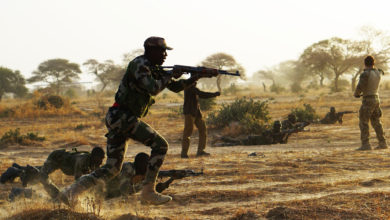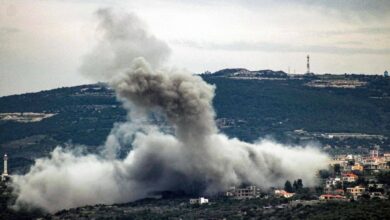At least four Chadian soldiers and a television reporter were killed when their vehicle hit a mine on a road in eastern Chad, security sources said Sunday.
The victims were in a convoy on Saturday, May 25 headed towards an army position that had been attacked by elements of the Boko Haram insurgent group overnight, the sources said.
The timeline of events is unclear.
“This delegation of the Chadian army was headed to N’Gounboua, where elements of Boko Haram had attacked an army position overnight, killing at least one on our side,” a security source told AFP.
Alwihda reported that 23 Boko Haram fighters were killed in Berkara, near N’Gouboua on Saturday night.
N’Gounboua is on the northeastern bank of Lake Chad, near the borders with Nigeria and Niger. The Islamic State West Africa Province faction of Boko Haram is the dominant insurgent force in the Lake Chad area, particularly in this area.
Multiple reports said the Deputy Chief of the General Staff of the Chadian Armed Forces was in the convoy, although RFI reported that the General Staff delegation traveled to the area by helicopter.
The AFP source said 23 Boko Haram fighters were killed, confirming an overall toll given by Chadian army spokesperson Azem Bermandoa on national television.
TchadInfos reported the spokesperson as saying six people had been killed in the explosion. Alwihda Info reported six were killed and 11 injured.
Dimouya Soiapebe, the head of Lake province, said soldiers and a journalist for the national broadcaster Télé Tchad had gone to the scene to “raise the morale of the troops.”
The reporter, Obed Nangbatna, was reportedly badly injured in the blast and later died from his wounds in a military hospital in N’Djamena.
“Terrorists often lay explosive devices on the roads leading to positions they have attacked,” Soiapebe said.
It is unclear whether the vehicle was struck by a buried mine or by a roadside bomb.
Update May 27 ISIS propaganda agency Amaq later on Sunday said ISWAP fighters in Chad attacked a military base in “Belgarm” on Friday, shelled another base with mortars, and “detonated an explosive device on a military vehicle,” claiming 30 soldiers were killed and others injured.
In March, 23 Chadian soldiers were killed in a Boko Haram attack in Dangdala, also spelled Dandala, which is in the N’Gouboua sub-prefecture. It was the deadliest attack on the Chadian army in the decade-long Boko Haram insurgency.
The Multinational Joint Task Force, a regional counter-insurgency force comprising personnel from Chad, Cameroon, Niger, and Nigeria, launched Operation Yancin Tafki on February 21 to battle the insurgents. It has said the cross-border operation is aimed at “making islands and other settlements in Lake Chad untenable for Boko Haram Terrorists.”
The jihadist group known as Boko Haram began its bloody insurgency in northeastern Nigeria in 2009, but it has since spread into neighboring Niger, Chad and Cameroon, prompting a regional military response.
Since 2009, more than 27,000 people have been killed and two million others displaced, sparking a dire humanitarian crisis in the region. On April 30, the U.S. Ambassador-at-Large and Coordinator for Counterterrorism Nathan A. Sales said that the U.S. assesses that Boko Haram and ISWAP “have been responsible for over 35,000 deaths since 2011.”
Boko Haram split into two factions in mid-2016. One, led by long-time leader Abubakar Shekau, is notorious for suicide bombings and indiscriminate killings of civilians. Shekau pledged allegiance to ISIS leader Abu Bakr Al-Baghdadi in March 2015, but ISIS central only gives formal backing to the other faction, which it calls Islamic State West Africa Province.
The ISWAP faction, which largely focuses on attacking military and government targets, was led by Abu Mus’ab Al-Barnawi, but in March, audio recordings revealed that ISIS appointed Abu Abdullah Idris bin Umar, also known as Ibn Umar al-Barnawi, as leader. ISIS has not yet made a public statement confirming the change.
On May 22, ISIS released a video showing ISWAP attacks and the execution of nine people, including one tank crewman who was killed with a rocket-propelled grenade.
With reporting from AFP












